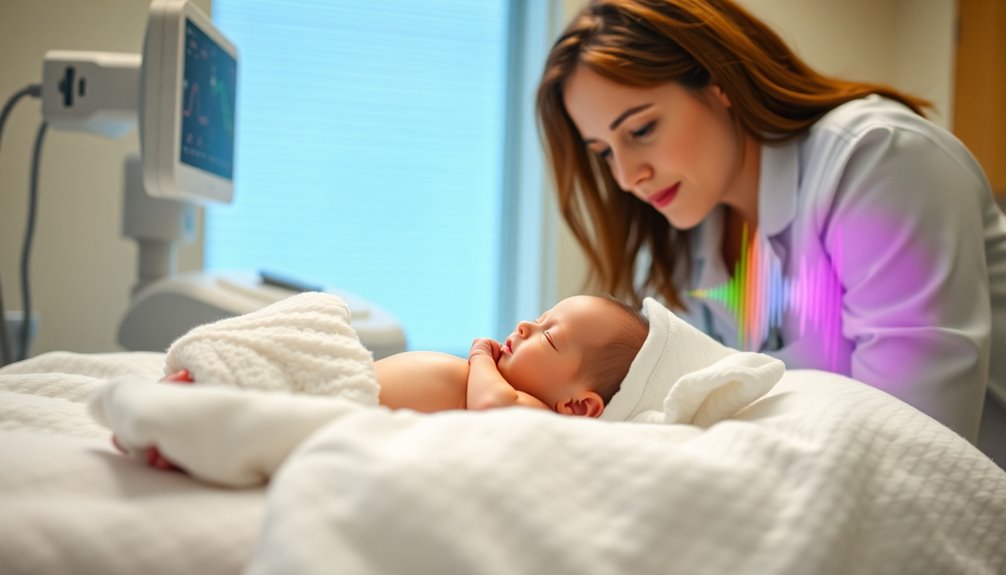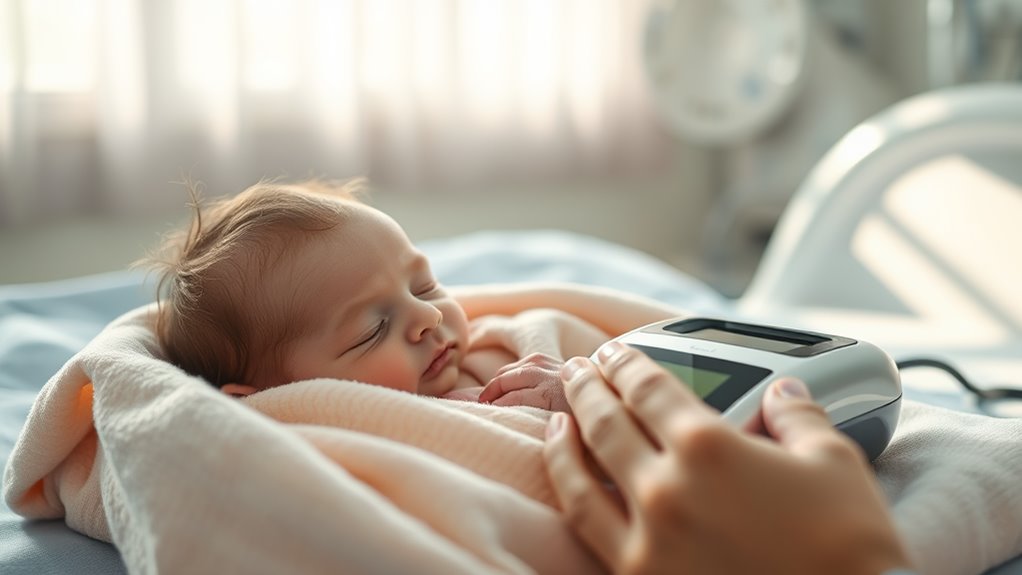Newborn hearing screenings are vital, as about 3-6 out of every 1,000 infants face hearing issues that can impact their language development. These quick, painless tests happen before your baby leaves the hospital. If your newborn doesn't pass, don't panic; many still have normal hearing. Early intervention is key, so keep an eye out for any warning signs. Want to know more about the screening process and what to look out for?
Key Takeaways
- Newborn hearing screenings are quick, safe, and painless tests conducted before hospital discharge to identify potential hearing loss.
- Approximately 3-6 out of every 1,000 newborns are affected by hearing issues, highlighting the importance of routine screenings.
- Over 95% of deaf newborns have parents with normal hearing, making early detection crucial for timely intervention.
- Failed screenings require follow-up with an audiologist, as many newborns may still have normal hearing despite initial results.
- Warning signs of hearing loss include lack of response to sounds, delayed babbling, and misunderstanding conversations, necessitating ongoing monitoring.
What Are Newborn Hearing Screenings?

Newborn hearing screenings are essential tests that help identify significant hearing loss in infants, ensuring early intervention for better language development.
These quick, safe, and painless screenings typically occur before hospital discharge, using methods like otoacoustic emissions (OAEs) and automated auditory brainstem response (AABR).
With approximately 3-6 out of every 1,000 newborns affected by hearing issues, early detection is critical. Most newborns sleep through the process, making it straightforward for you and your baby.
If your newborn doesn't pass the initial screening, follow-up testing is important, as they might still have normal hearing. Socialization critical for healthy development is not only vital for puppies but also highlights the importance of early detection in newborns for their overall growth and adaptation.
Why Screen Newborns?

Screening all infants for hearing loss is essential because even mild issues can hinder language development. The American Academy of Pediatrics recommends newborn hearing screenings to detect hearing loss as early as possible.
With 3-6 out of every 1,000 newborns facing considerable hearing issues, it's imperative to perform these tests, regardless of family history—over 95% of deaf newborns have parents with normal hearing.
Hearing loss often shows no visible signs, making timely screenings crucial. Receiving test results quickly allows for early intervention, which can greatly mitigate the impact on communication and developmental milestones. Mammography aims to detect breast cancer early guarantees your child has the best chance to thrive in their language development journey. Don't wait—screening is a proactive step for your newborn's future.
What if My Newborn Does Not Pass the Hearing Screening?

If your baby doesn't pass the hearing screening, don't panic; this is a common occurrence. It's vital to arrange a follow-up screening or hearing test with an audiologist within a few weeks. Many newborns who initially fail may still have normal hearing, so a thorough assessment is essential. Early intervention can be crucial, as research shows that addressing any diagnosed hearing loss early can greatly enhance your baby's communication skills, especially in relation to language development.
| Follow-Up Action | Purpose |
|---|---|
| Schedule follow-up | Confirm or rule out hearing loss |
| Auditory Brainstem Response (ABR) | Assess hearing function |
| Otoacoustic Emissions (OAE) | Evaluate inner ear health |
| Early intervention | Improve language development |
| Continuous monitoring | Detect later-developing hearing loss |
Addressing any diagnosed hearing loss early can greatly enhance your baby's communication skills. Don't hesitate to seek support from your audiologist!
What if My Newborn Passes the Hearing Screening?

Passing the hearing screening is great news, as it often indicates your baby has normal hearing.
However, it's important to remember that some newborns may still experience hearing loss that goes undetected. The hearing screening isn't a definitive diagnostic test, so ongoing monitoring of hearing is essential. Changes can occur due to illnesses or genetic factors later on.
If you have any concerns about your child's hearing, consult your pediatrician. They may refer you to an audiologist for further evaluation.
Routine hearing checks during childhood are recommended to catch any potential issues early. Staying vigilant with your baby's hearing health guarantees any changes are identified and addressed promptly, providing the best foundation for their development. Emotional expression is also crucial in helping children cope with any challenges they may face, including potential hearing issues.
Other Warning Signs of Hearing Loss

Recognizing early signs of hearing loss in your baby is essential for their development. Watch for a lack of response to loud noises, which can indicate poor auditory awareness.
By six months, most infants should be babbling; delays in this milestone might signal potential hearing issues. If your child doesn't say single words by their first birthday, it could suggest hearing loss affecting their language growth.
By six months, babies should babble; delays may indicate hearing issues. No single words by one year could signal language growth challenges.
Additionally, notice if your baby doesn't respond when you call their name or make other sounds—these are early warning signs. Misunderstanding conversations can also indicate hearing challenges, impacting their speech and language skills.
Stay vigilant after hearing screenings, as early intervention is vital for your child's development. Notably, understanding emotional triggers can aid parents in managing potential challenges during the adjustment period.
Frequently Asked Questions
What if My Baby Startles but Failed Hearing Test?
If your baby startles but failed the hearing test, it doesn't necessarily mean they've normal hearing.
Startling can happen for various reasons, like fluid in the ears or outside noise.
It's important to follow up with an audiologist within four weeks for a thorough evaluation.
Early intervention is essential, as addressing any potential hearing issues promptly can greatly enhance your baby's language and communication development.
Don't hesitate to seek help!
Should I Be Worried if My Newborn Failed Hearing Test?
If your newborn failed the hearing test, it's understandable to feel worried, but try not to panic just yet.
Many factors can affect the results, like fluid in the ears or movement during the screening.
Follow up with an audiologist within four weeks to get a clearer picture.
What Is the Timeline for Newborn Hearing Screening?
The timeline for newborn hearing screening typically starts within the first 1 to 2 days after birth, often before you leave the hospital.
If your baby doesn't pass the initial screening, you'll need to schedule a follow-up appointment with a hearing specialist within 4 weeks.
Ideally, a follow-up screening should occur between 4 to 5 weeks of age, but it can be done up to 3 months if necessary.
It's quick and painless!
What Happens if Baby Passed Hearing Test but Doesn't Respond to Sound?
If your baby passed the hearing test but doesn't respond to sound, you might feel a twinge of concern.
It's essential to pay attention to their reactions. Look for signs like not turning toward loud noises or missing babbling milestones by six months.
Consult a pediatrician or audiologist if you notice these behaviors; they'll guide you on the next steps.
Early detection can make a significant difference in your child's development, so don't hesitate!
Conclusion
In summary, newborn hearing screenings are essential for early detection and intervention. Did you know that about 1 in every 1,000 babies is born with hearing loss? Catching this early can make all the difference in your child's development and communication skills. If your newborn doesn't pass the screening, don't panic—follow up with your healthcare provider. By staying informed and proactive, you're giving your child the best chance for a bright future.









